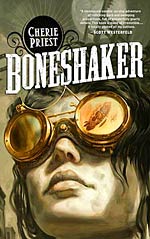
![]() verkisto
verkisto
7/26/2016
![]()
I'm not a fan of steampunk. In fact, if you want me to lose interest in something, just tell me that it's steampunk. The idea of it doesn't bother me as much as the people who treat it like a religion, but I tend to avoid it as much as I can. It just doesn't hold much interest for me. As to how I came to have Boneshaker in my collection is as much a surprise to me as it would be to anyone else who knows this about me. I heard about the book a few years ago and picked it up based on word-of-mouth and some short reviews, but the fact that it was a steampunk novel somehow escaped me.
The good news is that the steampunk element of the novel was pretty understated. Things run on steam, and there are airships, and people wear fancy goggles, but the story winds up being about as steampunk as the Leviathan series by Scott Westerfeld. The heart of the story is Briar Wilkes and her son, Zeke. Their relationship is somewhat strained due to their living conditions, and the fact that the absent father is responsible for the Blight, which is a gas that comes from underground, turns people into zombies, and is why a large part of Seattle has been walled off from the rest of the city. Zeke wants to convince the rest of the city that his father wasn't the man the rest of the city makes him out to be, and escapes into the walled-off part of the city to find answers. Briar follows him into the city to rescue him.
I have a habit of judging the time I will spend with a book based on its length and type size, and when I first glanced at Boneshaker -- 416 pages in trade paperback, with smallish type -- I figured I would be working on this novel for a couple of weeks at best. Instead, I found myself tearing through the story at the rate of about 100 pages a day, even when I had other things to do. It moves quickly, thanks to it being primarily an adventure novel, but it also moves along at a great clip because of Priest's pacing. The narrative jumps back and forth between Briar and Zeke's perspectives, usually flipping right at the moment when you want to know what's going to happen next to the character you're leaving. It's a cheap way to build suspense, but I'll be damned if it doesn't work.
I've seen some reviews that were critical of the development of Briar and Zeke, and I don't disagree with them. The secondary characters get more interesting backgrounds, while Briar and Zeke seem more to be defined by their relationship to Leviticus, the absent father. The only thing we really know about Zeke is that he's there to learn more about his father, and the only thing we really know about Briar is that she's going in to rescue her son. That's all we get as far as their development goes. This book is the start to a larger series, so maybe they're developed further in later books, but what's done with them in Boneshaker is minimal, at best. On the plus side, the weak characterization doesn't affect its readability; I just wish it had been a bit more developed.
This book is covered in blurbs, some from authors I know and like (Scott Westerfeld, Garth Ennis, Wil Wheaton), others from authors I know and don't like (Cory Doctorow, though his recommendations are usually in line with what I like), and a whole bunch from authors I've never heard of. There was a lot of hype heading into it, though, and sometimes that can set me up for disappointment. Luckily, the book is readable and enjoyable, despite its few foibles, and I think anyone who enjoys adventure, urban fantasy, or, yes, even steampunk, would enjoy it.